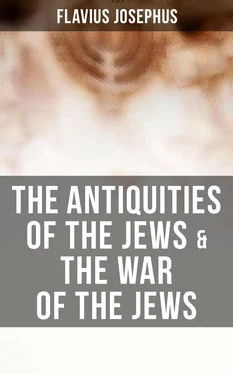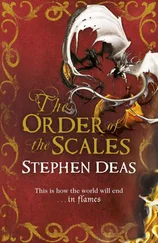CHAPTER 10
How Abram Fought With The Assyrians, And Overcame Them, And Saved The Sodomite Prisoners, And Took From The Assyrians The Prey They Had Gotten
Table of Contents
1. When, Abram heard of their calamity, he was at once afraid for Lot his kinsman, and pitied the Sodomites, his friends and neighbors; and thinking it proper to afford them assistance, he did not delay it, but marched hastily, and the fifth night fell upon the Assyrians, near Dan, for that is the name of the other spring of Jordan; and before they could arm themselves, he slew some as they were in their beds, before they could suspect any harm; and others, who were not yet gone to sleep, but were so drunk they could not fight, ran away. Abram pursued after them, till, on the second day, he drove them in a body unto Hoba, a place belonging to Damascus; and thereby demonstrated that victory does not depend on multitude and the number of hands, but the alacrity and courage of soldiers overcome the most numerous bodies of men, while he got the victory over so great an army with no more than three hundred and eighteen of his servants, and three of his friends: but all those that fled returned home ingloriously.
2. So Abram, when he had saved the captive Sodomites, who had been taken by the Assyrians, and Lot also, his kinsman, returned home in peace. Now the king of Sodom met him at a certain place, which they called The King's Dale, where Melchisedec, king of the city Salem, received him. That name signifies, the righteous king: and such he was, without dispute, insomuch that, on this account, he was made the priest of God: however, they afterward called Salem Jerusalem. Now this Melchisedec supplied Abram's army in an hospitable manner, and gave them provisions in abundance; and as they were feasting, he began to praise him, and to bless God for subduing his enemies under him. And when Abram gave him the tenth part of his prey, he accepted of the gift: but the king of Sodom desired Abram to take the prey, but entreated that he might have those men restored to him whom Abram had saved from the Assyrians, because they belonged to him. But Abram would not do so; nor would make any other advantage of that prey than what his servants had eaten; but still insisted that he should afford a part to his friends that had assisted him in the battle. The first of them was called Eschol, and then Enner, and Mambre.
3. And God commended his virtue, and said, Thou shalt not however lose the rewards thou hast deserved to receive by such thy glorious actions. He answered, And what advantage will it be to me to have such rewards, when I have none to enjoy them after me? — for he was hitherto childless. And God promised that he should have a son, and that his posterity should be very numerous; insomuch that their number should be like the stars. When he heard that, he offered a sacrifice to God, as he commanded him. The manner of the sacrifice was this: — He took an heifer of three years old, and a she-goat of three years old, and a ram in like manner of three years old, and a turtle-dove, and a pigeon 1and as he was enjoined, he divided the three former, but the birds he did not divide. After which, before he built his altar, where the birds of prey flew about, as desirous of blood, a Divine voice came to him, declaring that their neighbors would be grievous to his posterity, when they should be in Egypt, for four hundred years; 2during which time they should be afflicted, but afterwards should overcome their enemies, should conquer the Canaanites in war, and possess themselves of their land, and of their cities.
4. Now Abram dwelt near the oak called Ogyges, — the place belongs to Canaan, not far from the city of Hebron. But being uneasy at his wife's barrenness, he entreated God to grant that he might have male issue; and God required of him to be of good courage, and said that he would add to all the rest of the benefits that he had bestowed upon him, ever since he led him out of Mesopotamia, the gift of children. Accordingly Sarai, at God's command, brought to his bed one of her handmaidens, a woman of Egyptian descent, in order to obtain children by her; and when this handmaid was with child, she triumphed, and ventured to affront Sarai, as if the dominion were to come to a son to be born of her. But when Abram resigned her into the hand of Sarai, to punish her, she contrived to fly away, as not able to bear the instances of Sarai's severity to her; and she entreated God to have compassion on her. Now a Divine Angel met her, as she was going forward in the wilderness, and bid her return to her master and mistress, for if she would submit to that wise advice, she would live better hereafter; for that the reason of her being in such a miserable case was this, that she had been ungrateful and arrogant towards her mistress. He also told her, that if she disobeyed God, and went on still in her way, she should perish; but if she would return back, she should become the mother of a son who should reign over that country. These admonitions she obeyed, and returned to her master and mistress, and obtained forgiveness. A little while afterwards, she bare Ismael; which may be interpreted Heard of God, because God had heard his mother's prayer.
5. The forementioned son was born to Abram when he was eighty-six years old: but when he was ninety-nine, God appeared to him, and promised him that he Should have a son by Sarai, and commanded that his name should be Isaac; and showed him, that from this son should spring great nations and kings, and that they should obtain all the land of Canaan by war, from Sidon to Egypt. But he charged him, in order to keep his posterity unmixed with others, that they should be circumcised in the flesh of their foreskin, and that this should be done on the eighth day after they were born: the reason of which circumcision I will explain in another place. And Abram inquiring also concerning Ismael, whether he should live or not, God signified to him that he should live to be very old, and should be the father of great nations. Abram therefore gave thanks to God for these blessings; and then he, and all his family, and his son Ismael, were circumcised immediately; the son being that day thirteen years of age, and he ninety-nine.
1It is worth noting here, that God required no other sacrifices under the law of Moses, than what were taken from these five kinds of animals which he here required of Abram. Nor did the Jews feed upon any other domestic animals than the three here named, as Reland observes on Antiq. B. IV. ch. 4. sect. 4.
2As to this affliction of Abram's posterity for 400 years, see Antiq. B. II. ch. 9. sect. 1.
CHAPTER 11
How God Overthrew The Nation Of The Sodomites, Out Of His Wrath Against Them For Their Sins
Table of Contents
1. About this time the Sodomites grew proud, on account of their riches and great wealth; they became unjust towards men, and impious towards God, insomuch that they did not call to mind the advantages they received from him: they hated strangers, and abused themselves with Sodomitical practices. God was therefore much displeased at them, and determined to punish them for their pride, and to overthrow their city, and to lay waste their country, until there should neither plant nor fruit grow out of it.
2. When God had thus resolved concerning the Sodomites, Abraham, as he sat by the oak of Mambre, at the door of his tent, saw three angels; and thinking them to be strangers, he rose up, and saluted them, and desired they would accept of an entertainment, and abide with him; to which, when they agreed, he ordered cakes of meal to be made presently; and when he had slain a calf, he roasted it, and brought it to them, as they sat under the oak. Now they made a show of eating; and besides, they asked him about his wife Sarah, where she was; and when he said she was within, they said they would come again hereafter, and find her become a mother. Upon which the woman laughed, and said that it was impossible she should bear children, since she was ninety years of age, and her husband was a hundred. Then they concealed themselves no longer, but declared that they were angels of God; and that one of them was sent to inform them about the child, and two of the overthrow of Sodom.
Читать дальше












